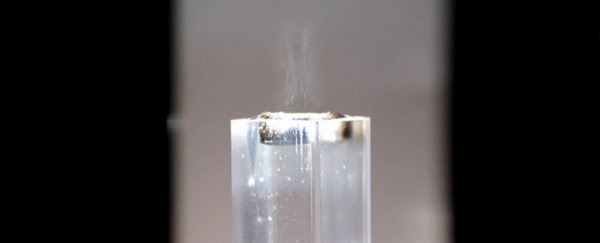Using an innovative combination of sunshine and hydrogels, a new device just unveiled by scientists is able to produce clean drinking water from virtually any source – even the salty waters of the Dead Sea.
This new technique could prevent tens of thousands of death every year, since access to safe drinking water is at a premium in many developing nations, not to even mention the wake of a natural disaster or emergency anywhere in the world.
The technology is compact, inexpensive, and uses ambient solar energy in order to evaporate water and remove impurities, making it a substantial upgrade over similar processes that have been used in the past.
"Water desalination through distillation is a common method for mass production of freshwater," says one of the researchers, Fei Zhao from the University of Texas at Austin.
"However, current distillation technologies, such as multi-stage flash and multi-effect distillation, require significant infrastructures and are quite energy-intensive."
"Solar energy, as the most sustainable heat source to potentially power distillation, is widely considered to be a great alternative for water desalination."
The new filtering device works by combining several gel-polymer hybrid materials that mix both hydrophilic (water-attracting) and semiconducting (solar-adsorbing) properties.
The nanostructure of the gels enables more water vapour to be produced from less solar energy, and without the complicated series of optical instruments that existing devices use to concentrate sunlight. Here, that concentration isn't needed.
When a jar of contaminated water is placed in direct sunlight with the hydrogel evaporator on top, vapour is released that's then trapped and stored by a condenser.
"We have essentially rewritten the entire approach to conventional solar water evaporation," says lead researcher Guihua Yu, from the University of Texas at Austin.
To give their new contraption a thorough testing, the researchers tried it out at the Dead Sea, which borders Israel, the West Bank, and Jordan. With a salinity of around 34 percent, it's about ten times as salty as your standard ocean water.
The hydrogel filtering device passed its test with flying colours, producing drinking water from the Dead Sea that met the accepted drinking water standards put down by the World Health Organisation (WHO) and the US Environmental Protection Agency (EPA).
"Our outdoor tests showed daily distilled water production up to 25 liters per square meter, enough for household needs and even disaster areas," says Yu.
"Better still, the hydrogels can easily be retrofitted to replace the core components in most existing solar desalination systems, thereby eliminating the need for a complete overhaul of desalination systems already in use."
It's going to take some time to convert this research into a commercial, finished product, but with around 1 in 9 people on the planet currently without a clean source of drinking water close to home, such a device could have a huge impact.
We've seen some other fantastically clever water filtering devices recently too: last year a team in Germany tested a system of microbots that could buzz through water and remove more than 80 percent of the bacteria in it.
Elsewhere, other scientists have been developing a graphene-oxide membrane to sieve salt out of seawater. Let's hope we can get these promising innovations out of the lab and into the hands of the people that need them - as soon as possible.
The research has been published in Nature Nanotechnology.
